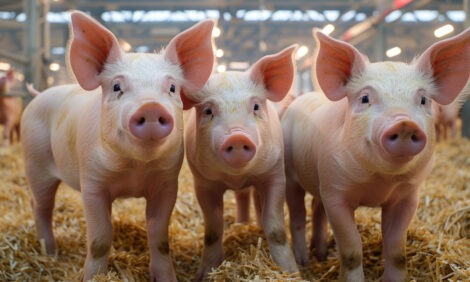



Fine-Tuning Fertility
By Judy Maus, Ontario Pork - Researchers look at AI timing and semen preservation to investigate ways of improving swine breeding efficiency.
Any breeder will say frozen swine
semen most commonly used for
artificial insemination (AI) is
finicky, with a useful life of only a
few hours once it’s thawed. To
make matters worse, sows generally
only conceive when inseminated
at particular times, leaving
a very small window for successful
conception.
That’s why University of Guelph
Prof. Glen Cassar and graduate
student Miguel Valcarce,
Department of Population
Medicine, are trying to find ways
to make swine breeding more
efficient. With a combination of
impeccable AI timing and a new
thawed semen preservation
method, the researchers are
developing a new strategy they
hope will increase successful AI
breeding rates in swine.
“These new methods have so far
managed to save a lot of time,
labour and money,” says
Valcarce. “Suddenly, AI has
become a much more efficient
process.”
Frozen semen allows for higher
biosecurity standards in herds,
unlimited preservation of top
quality genetic lines and worldwide
access to valuable animals,
he says. Although AI with frozen
semen is commonly used to breed
many species, it isn’t very successful
in swine. Freezing swine
semen has been known to damage
sperm cells – and once thawed,
sperm cells only last four to six
hours.
Now, after experimenting with
different sperm stabilizers, Cassar
and Valcarce have found that
adding seminal plasma – the component
of boar semen that contains
proteins, sugars and lipids
but no actual sperm – to thawed
boar semen prolongs the fertilization
ability of frozen sperm cells
to at least 12 hours.
The researchers are combining
these findings with their ongoing
research on AI timing for higher
sow conception rates. With the
exact timing required for AI
breeding in swine, says Valcarce,
those extra hours can significantly
increase chances of successful
insemination.
Another major challenge among
swine breeders is pinpointing the
exact timing of ovulation during
an estrus cycle. With the short
lifespan of thawed sperm cells,
breeders using AI can only hope
that they’re inseminating sows
during the critical hours before
ovulation, when conception is
most likely to occur.
A sow is generally in heat for
three days in breeding season,
during which time breeders may
be inseminating them up to three
times. That’s inefficient, unreliable
and time-consuming, with
many expensive semen samples
going to waste. Adding another
six to eight hours of life to thawed
sperm increases the likelihood
that sperm cells will be active
during ovulation, boosting the
rate of successful AI.
Research by Cassar has simplified
the AI process even further, by
clearing up the grey area between
the onset of estrus and ovulation.
While it’s known that three to five
hours prior to ovulation is the
optimal time for conception, producers
had no way of determining
when the sow was at that stage.
So, Cassar used two synthetic
hormones to control ovulation
very precisely. This method,
which is available to producers,
optimizes swine AI and allows for
higher pregnancy rates while
using less boar semen.
Preliminary results are promising.
Historically, swine AI breeding
with frozen semen shows low
pregnancy rates, says Valcarce,
but so far he has found that
conception rates become similar
to those seen with fresh doses
when timed AI is combined with
their thawed sperm preservation
technique.
In the future, the researchers
want to isolate the exact components
in seminal plasma that are
responsible for the preserving
effect in thawed semen. They also
hope to maintain high numbers of
sows that reach full-term in their
pregnancies.
University of Guelph Profs. Mary
Buhr, Department of Animal and
Poultry Science, and Robert
Friendship, Department of
Population Medicine, are working
together in this research, which is
being sponsored by Ontario Pork.
For more information, contact
Jean Howden, Ontario Pork
research coordinator, at 1-877-
668-7675 or jean.howden@ontariopork.
on.ca.
Source: Ontario Pork - June 2005
Judy Maus is a writer with SPARK, the University of Guelph’s student writing program.









